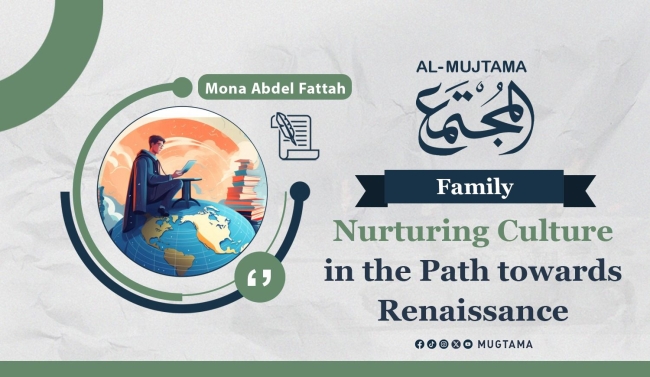Nurturing Culture in the Path towards Renaissance Featured
We often hear in our Arab media about an artistic family or a sporty family, but rarely do we hear about intellectual families, radiating with literature, culture, knowledge, and brilliance, at a time when there is a decline in seeking knowledge and no appetite for learning.
Perhaps we are facing a state of complacency and triviality, or a kind of neglect and indifference, compared to an unprecedented interest in social media, video clips, violent games, and pornography, which tear down more than they build and harm more than they benefit.
Culture has disappeared from our homes; books have been neglected; newspapers have vanished; magazines have deserted; and authentic references and dictionaries have disappeared. Browsing through simple pages has become a burden for Arab and Muslim families.
Did you know that the average Arab child reads for only 7 minutes annually, and that the average amount read by individuals in the Arab world annually is only a quarter of a page? Starkly, this is the Ummah, with its first revelation of the Quran being: “Read in the name of your Lord who created.” (Al-Alaq: 1).
You might feel both astonishment and shock at the same time when you learn that book publications in European countries are significantly higher than in the Arab world, which publishes only two books per 100 books in Europe, only reaching 1650 books annually. Meanwhile, the United States publishes 85,000 books annually, according to a report by the United Nations Educational, Scientific, and Cultural Organization (UNESCO).
There is a vast difference in reading rates between what is supposed to be the “Iqraa” Ummah, according to the Quran, and the West. In the United States, the average is 11 books per person annually, and in Britain, it's seven books. This is in stark contrast to just a quarter of a page per person in the Arab world. The gap is also terrifying between American children who read for 6 minutes daily and Arab children who read for 7 minutes annually!
Have you ever asked yourself how many books you've read since the beginning of the year, or rather, how many books you read last year? How many pages have you flipped through, and how much time have you spent reading in any field?
Why are we at the bottom of the list of nations in reading? Our noble Prophet (peace be upon him) even mandated the polytheist prisoners of the battle of Badr (2 AH) to teach ten Muslims to read in order to release them, as if it were a lifeline from ignorance, equivalent to the freedom of a human being from captivity.
We are in desperate need of creating a generation of readers who will lead the Ummah out of darkness and into light. This can only be achieved through education and knowledge, making reading a way of life and a cultural tradition embraced by the young and the old.
The cultured family is not a luxury or a fantasy we long for; it's a societal need and perhaps a vital necessity to illuminate the path for future generations, to distinguish between the beneficial and the harmful, the truth and falsehood, and good from evil.
Here, we warn of the children's reluctance to read, their boredom, and their turning away from knowledge and education to other pursuits. These pursuits may present poison as honey, offer triviality that neither nourish nor satisfy hunger, and perhaps even contribute to what can be called “cultural chaos,” stirring up discord, demeaning heritage, propagating falsehood, and deviating from the truth.
Our minds and souls are in desperate need of religious and worldly knowledge, filling our hearts and illuminating our insights. This grants us wisdom encompassing knowledge, understanding, experience, and religious proficiency.
Why not explore with our children the depths of the Prophet's Sirah, Islamic history, the books of hadith and Fiqh, the treasures of literature, poetry, and culture, the sciences of astronomy, medicine, and engineering, and modern technology and science?
In every household, let's establish a library, even if small, place a story or novel in the car, and present electronic books in an appealing form to children, turning them into film material or visual or audio works (podcasts), especially as young people are the most inclined to this type, with 45 million podcast episodes recorded in 2021, according to an American study.
We must think outside the box in new methods to encourage young generations to read, using different formats and images, from paperbacks in PDFs available on many websites to EPUB format, allowing control over electronic books by changing fonts, enlarging or reducing them, putting lines under the desired passages, and listening to them audibly. Additionally, podcast clips are circulated on social media, providing various platforms at affordable prices to give books a chance to spread globally and across different age groups.
A “cultured family” will be a cornerstone in restoring the glory of the Ummah, a step towards pushing children and youth to love the heritage and thought, and embracing knowledge, in line with the tremendous developments in technology and communication. Thus, we create an enlightened awareness and a cultured mind, leading the desired renaissance in the 21st century.
-------------------------------------------------------------


